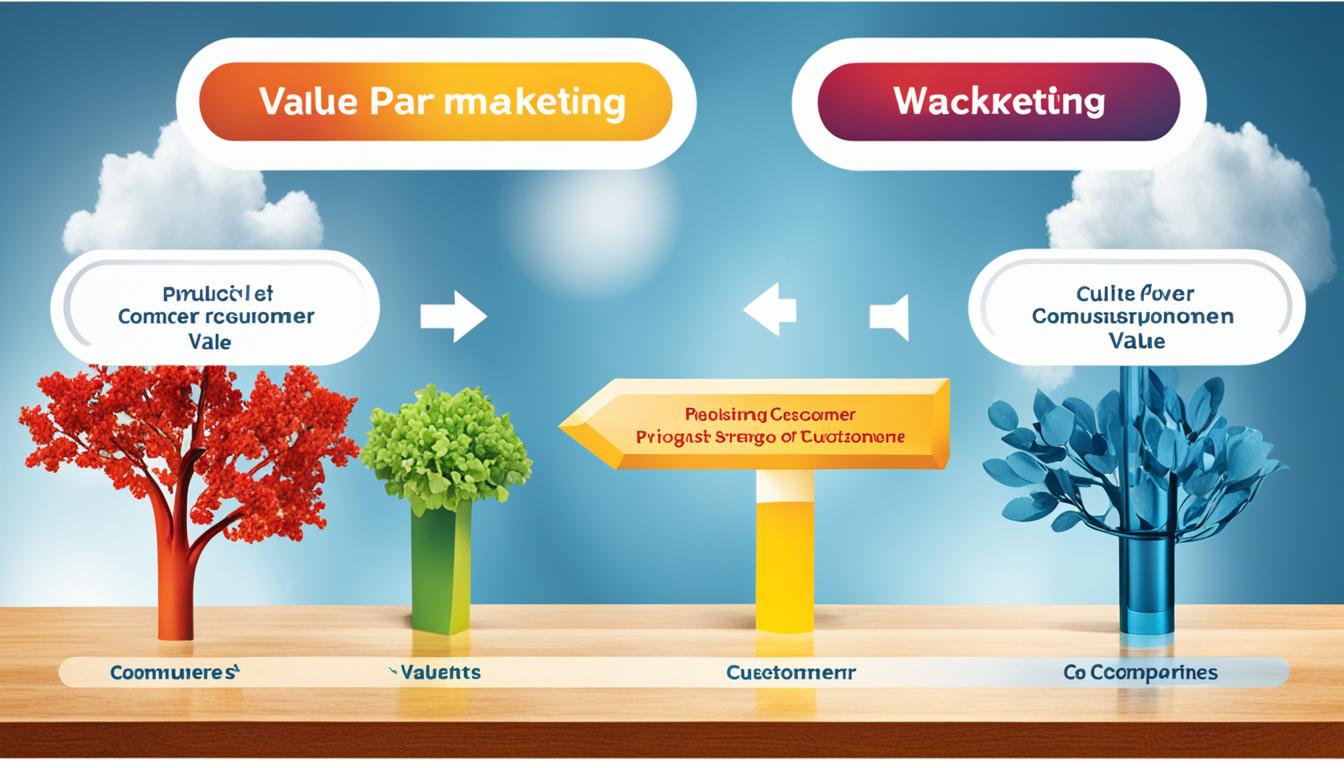Precision marketing, also known as targeted marketing, personalized marketing, or data-driven marketing, is a strategic approach that focuses on targeting existing customers through personalized messages and offers. By analyzing customer data and market segments, precision marketing aims to understand customer behavior and preferences to deliver tailored marketing efforts.
With precision marketing, businesses can increase customer loyalty and drive sales by providing personalized experiences that resonate with their audience. This approach allows businesses to adapt quickly to changing market dynamics and customer expectations.
Examples of precision marketing initiatives include loyalty programs, personalized recommendations, and targeted promotions. These strategies leverage data analysis to provide customers with relevant and timely offers, ultimately enhancing their overall experience and satisfaction.
Key Takeaways:
- Precision marketing focuses on targeting existing customers through personalized messages and offers.
- Data analysis and market segmentation play a crucial role in understanding customer behavior and preferences.
- Precision marketing initiatives include loyalty programs, personalized recommendations, and targeted promotions.
- By leveraging precision marketing, businesses can increase customer loyalty and drive sales.
- This approach allows businesses to adapt quickly to changing market dynamics and customer expectations.
The Importance of Precision Marketing
Precision marketing plays a critical role in today’s ever-changing market. Businesses that employ precision marketing strategies have a competitive advantage over those using traditional methods. By analyzing customer data and tailoring marketing messages, precision marketing enables businesses to adapt quickly to customer expectations and drive meaningful customer engagement.
One of the key benefits of precision marketing is its cost efficiency. Rather than casting a wide net with mass marketing campaigns, precision marketing allows businesses to target specific customer segments, optimizing their marketing budgets and maximizing the potential return on investment (ROI).
Moreover, precision marketing helps businesses enhance customer retention. By understanding customer preferences, businesses can create personalized experiences that resonate with their target audience. This personalized approach fosters deeper connections with customers, increasing their loyalty and reducing customer churn.
Improved Customer Satisfaction Through Precision Marketing
In addition to cost efficiency and customer retention, precision marketing also leads to enhanced customer satisfaction. When businesses tailor their marketing messages to align with customer preferences, it creates a more relevant and personalized experience for customers. This level of customization and attention to detail strengthens the relationship between the business and its customers, ultimately resulting in higher customer satisfaction levels.
Tracking Return on Investment (ROI)
Precision marketing allows businesses to track the return on investment (ROI) of their marketing efforts more effectively. By leveraging customer data and analytics, businesses can measure the impact of their marketing campaigns and make data-driven decisions. This capability enables businesses to optimize their marketing strategies, allocate resources more efficiently, and ensure that every marketing dollar spent contributes to the overall success of the business.
Benefits of Precision Marketing
| Benefit | Description |
|---|---|
| Cost Efficiency | Precision marketing optimizes marketing budgets by targeting specific customer segments, reducing wasteful spending. |
| Customer Retention | Personalized marketing messages and experiences foster customer loyalty and reduce customer churn. |
| Enhanced Customer Satisfaction | Customized marketing messages create a more relevant and personalized customer experience, resulting in higher satisfaction levels. |
| ROI Tracking | By leveraging customer data and analytics, businesses can track the impact and effectiveness of their marketing campaigns, ensuring optimal resource allocation. |
Developing a Precision Marketing Strategy
Creating an effective precision marketing strategy requires a systematic approach that incorporates market analysis, understanding the target audience, and enhancing customer retention. By implementing these key elements, businesses can refine their marketing efforts and drive better results.
1. Market Analysis
Thorough market analysis is the foundation of a successful precision marketing strategy. By analyzing market trends, competitors, and customer behavior, businesses can gain valuable insights to inform their marketing decisions. It involves gathering and analyzing data related to customer demographics, preferences, and purchasing behavior. This information helps identify target audience segments and tailor marketing messages to their specific needs and interests.
2. Understanding the Target Audience
Understanding the target audience is crucial for precision marketing. It involves identifying the specific needs, motivations, and pain points of the target audience segments discovered during market analysis. This in-depth understanding allows businesses to craft personalized marketing messages and offers that resonate with their target audience, increasing the likelihood of engagement and conversion.
3. Enhancing Customer Retention
Customer retention is a vital component of precision marketing. By prioritizing customer retention, businesses can build long-lasting relationships with their existing customers, increasing their lifetime value. One effective way to enhance customer retention is by implementing loyalty programs. These programs reward customers for their repeat business, encourage brand loyalty, and incentivize future purchases. Loyalty programs can offer exclusive discounts, personalized recommendations, or early access to new products or services.
4. Staying Updated on Customer Trends
Customer trends are constantly evolving, and businesses must stay up-to-date to maintain a competitive edge. By staying updated on customer trends, businesses can identify emerging opportunities, understand shifts in customer behavior, and adapt their precision marketing strategy accordingly. This requires continuous monitoring of customer preferences, technological advancements, and changes in the target market. Data-driven decision-making is essential in ensuring the precision marketing strategy remains relevant and responsive to the evolving needs of the target audience.
By following these steps and continually refining the strategy based on market analysis and customer insights, businesses can develop a powerful precision marketing strategy that maximizes customer engagement, improves ROI, and fosters long-term customer relationships.
Who Implements Precision Marketing?
Precision marketing is a versatile strategy that can be implemented by businesses of all sizes. It offers opportunities for small businesses to utilize simple yet effective tactics to encourage repeat customers and drive growth. On the other hand, larger companies in highly competitive industries, such as retail, hospitality, and travel, invest substantial resources in data collection and analysis to create personalized marketing campaigns.
Small businesses often employ tactics like loyalty punch cards to incentivize customers to return. By offering rewards for repeat purchases, they can foster customer loyalty and increase sales. This approach is particularly beneficial for local businesses seeking to build a strong customer base and establish a positive reputation within the community.
On the other end of the spectrum, large companies capitalize on their extensive resources to implement precision marketing on a grander scale. By leveraging advanced data analytics and customer segmentation, they craft targeted marketing campaigns that resonate with their audience. These campaigns can involve personalized recommendations, tailored promotions, and exclusive loyalty programs to enhance the overall customer experience.
Precision marketing is adaptable and can be tailored to suit the specific needs and capabilities of different businesses. Whether it’s a small local shop or a multinational corporation, precision marketing presents an opportunity to engage with customers on a deeper level and drive business growth.
Precision Marketing in Action: Case Studies
Several companies have successfully implemented precision marketing strategies. Let’s take a look at some notable examples:
Boloco
Boloco, a popular burrito maker, has implemented a precision marketing strategy centered around a loyalty program based on a points system. With each purchase, customers earn points that can be redeemed for free food and exclusive offers. This program not only encourages repeat business but also allows Boloco to gather valuable customer data for future personalized marketing campaigns.
Virgin Airlines
Virgin Airlines has adopted a tiered benefit system as part of their precision marketing strategy. Customers who fly frequently with Virgin Airlines are rewarded with increased benefits as they move up the loyalty ladder. These benefits can include priority boarding, access to exclusive lounges, and discounted airfare. By tailoring rewards to customer loyalty, Virgin Airlines enhances customer satisfaction and encourages continued engagement.
Amazon Prime
Amazon has successfully implemented a precision marketing strategy through its Prime loyalty program. Customers pay a subscription fee for Prime membership, which grants them numerous benefits, including free two-day shipping, access to exclusive deals, and streaming services. This program not only encourages customer loyalty but also creates a sense of exclusivity and urgency, driving customer engagement and increased spending.
Patagonia
Patagonia’s precision marketing strategy focuses on sustainability and customer empowerment. Through their loyalty program, customers have the option to sell their old Patagonia apparel online. This initiative not only promotes environmental sustainability by extending the lifecycle of products but also provides customers with a platform to connect and engage with like-minded individuals. By aligning their loyalty program with their brand values, Patagonia fosters strong customer relationships and loyalty.
American Express
American Express partners with major retailers to offer easy redemption of rewards as part of their precision marketing strategy. This allows their customers to enjoy the benefits of their loyalty program across various brands and experiences. By providing a seamless and convenient redemption process, American Express strengthens customer engagement and enhances the overall value of their loyalty program.
GrubHub
GrubHub, a leading online food delivery platform, has implemented a gamification aspect in their loyalty program. Customers have the opportunity to play a game and win free food for a year. This interactive and engaging approach not only encourages participation but also creates a sense of excitement and anticipation, driving customer loyalty and repeat business.

Careers in Precision Marketing
Precision marketing offers a wide range of career opportunities for individuals interested in data-driven marketing and personalized advertising. Several roles within precision marketing are crucial for implementing successful strategies and achieving business objectives.
Market Researcher
Market researchers play a vital role in precision marketing by analyzing market data to identify trends and consumer behavior. They collect and interpret data to gain insights into customer preferences, purchasing habits, and market dynamics. By understanding the target audience, market researchers help businesses create more relevant advertising messages and refine their marketing strategies.
Loyalty Program Manager
Loyalty program managers are responsible for developing and implementing effective strategies to build customer loyalty and drive repeat business. They design and manage loyalty programs that offer incentives, rewards, and personalized experiences to keep customers engaged and satisfied. Loyalty program managers leverage data analysis to identify customer preferences, develop targeted promotions, and create strategies for customer retention.
Copywriter
Copywriters play a crucial role in precision marketing by creating persuasive ad copy and tailoring messaging to specific target audiences. They use data-driven insights to craft compelling content that resonates with customers, drives engagement, and promotes brand loyalty. Copywriters work closely with market researchers and design teams to ensure consistency in messaging and deliver impactful marketing campaigns.
Average Salaries
The average salaries for precision marketing roles vary depending on factors such as experience, expertise, and location. Here is a breakdown of average salaries for these positions:
| Position | Average Salary (USD) |
|---|---|
| Market Researcher | $60,000 – $80,000 |
| Loyalty Program Manager | $70,000 – $100,000 |
| Copywriter | $40,000 – $80,000 |
These salary ranges are approximate and can vary based on factors such as industry, company size, and individual qualifications. Professionals with more experience and expertise may command higher salaries within these ranges.
Marketing Trends Driving Precision Marketing
Precision marketing is at the forefront of marketing strategies, driven by several key trends that shape its development and implementation. Staying abreast of these trends allows businesses to effectively engage customers, meet their expectations, and create meaningful connections.
Agile Marketing
Agility is paramount in precision marketing. Adapting quickly to market changes and responding to real-time customer feedback ensures businesses remain competitive and relevant. By embracing agile marketing practices, companies can pivot their strategies and campaigns to deliver the right message at the right time, maximizing customer engagement and driving successful outcomes.
Customer Expectations
Customer expectations are evolving rapidly, particularly in terms of user experience. Today’s consumers expect a frictionless and personalized journey across all touchpoints. To meet these expectations, businesses must continuously refine their marketing strategies. By leveraging data analysis, businesses can understand customer preferences and behaviors, enabling the delivery of tailored experiences that align with customer expectations.
Connection Marketing
Connection marketing is rooted in understanding customer psychology and creating strategies that resonate with specific audiences. It emphasizes building meaningful connections with customers, fostering long-term relationships, and driving brand loyalty. By leveraging customer data, businesses can create personalized experiences that enhance customer satisfaction and loyalty. Through connection marketing, businesses can deliver targeted messages and offers that resonate with individual customers, strengthening the bond between the brand and its audience.
Marketing Trends Driving Precision Marketing
| Trend | Description |
|---|---|
| Agile Marketing | Adapting quickly to market changes and responding to real-time customer feedback for enhanced customer engagement and successful outcomes. |
| Customer Expectations | Keeping pace with evolving customer expectations, particularly in terms of a frictionless and personalized user experience. |
| Connection Marketing | Creating tailored strategies that resonate with specific audiences, fostering meaningful connections and driving brand loyalty. |
The Benefits of Precision Marketing
Precision marketing offers several benefits for businesses. By conducting market analysis and understanding consumer behavior and preferences, companies can create targeted messaging that leads to more effective engagement. This targeted approach allows businesses to focus their resources on the most relevant customers, resulting in improved cost efficiency. Additionally, precision marketing enhances customer satisfaction, fosters brand loyalty, and strengthens the connection between customers and the brand. By staying on top of market trends and adapting quickly, businesses can gain a competitive advantage in their industry.
- Market analysis enables a deep understanding of consumer behavior and preferences.
- Targeted messaging leads to more effective customer engagement.
- Precision marketing focuses resources on the most relevant customers, improving cost efficiency.
- Enhanced customer satisfaction and loyalty are key benefits of precision marketing.
- By staying up-to-date with market trends and adapting quickly, businesses can gain a competitive advantage.
Implementing a Successful Precision Marketing Strategy
Effective precision marketing strategies prioritize customer engagement and cater to their needs. To achieve success, businesses must focus on building a strong online presence through various social media platforms. Utilizing these platforms enables businesses to connect with their target audience, drive customer engagement, and establish brand loyalty. A strong online presence facilitates direct communication with customers, allowing businesses to better understand their preferences and customize their marketing efforts accordingly.
Moreover, offering real value to repeat customers is crucial for sustaining their loyalty and driving conversions. By consistently providing exceptional products, services, discounts, or exclusive offers, businesses can ensure that customers feel valued and appreciated. This real value encourages repeat purchases and promotes positive word-of-mouth, further increasing customer engagement and brand loyalty.
Creating a Desirable Customer Experience
Authenticity plays a key role in precision marketing. Customers are more likely to engage with brands that are transparent, honest, and true to their values. By creating a desirable customer experience that aligns with their needs and desires, businesses can foster a strong emotional connection with their customers. This emotional connection enhances brand loyalty and encourages customers to advocate for the brand, both online and offline.
Staying on Top of Trends
Efficient precision marketing strategies require businesses to stay updated on the latest industry trends and consumer behavior patterns. By researching and analyzing market trends, businesses can identify emerging opportunities and adapt their marketing approach accordingly. Staying on top of trends ensures that businesses remain relevant, engaging customers with fresh and innovative strategies that resonate with their preferences and needs.
Implementing precision marketing strategies that prioritize customer engagement, build a strong online presence, offer real value to repeat customers, promote authenticity, create a desirable customer experience, and stay on top of trends enables businesses to achieve impressive results. By focusing on these key areas, businesses can cultivate strong connections with their customers, foster loyalty, and drive conversions.

Building Brand Loyalty Through Precision Marketing
Precision marketing is a powerful tool for businesses looking to build brand loyalty. By leveraging data-driven strategies and personalized messaging, businesses can create strong connections with their target audience. To effectively build brand loyalty through precision marketing, there are several key factors to consider:
Maintaining a Strong Brand Image
A strong brand is essential for attracting and retaining customers. Precision marketing allows businesses to showcase their brand in a way that resonates with their audience. By crafting tailored messages and experiences, businesses can reinforce their brand identity and build trust.
Understanding Audience Habits
Understanding the habits and preferences of your audience is crucial for precision marketing success. By analyzing customer data and market trends, businesses can identify patterns and tailor their marketing efforts accordingly. This enables businesses to deliver relevant and personalized content that captures the attention and interest of their target audience.
Setting Realistic Goals
Setting clear and achievable goals is essential for any marketing strategy. When it comes to precision marketing, it’s important to define specific goals that align with your overall brand objectives. Whether it’s increasing customer retention, driving sales, or boosting brand advocacy, setting realistic goals allows businesses to measure the success of their precision marketing efforts.
Making Retention a Priority
Retention is key when it comes to building brand loyalty. Precision marketing allows businesses to identify and engage with their most valuable customers, ensuring they feel valued and appreciated. By implementing loyalty programs, personalized promotions, and targeted messaging, businesses can strengthen their relationships with existing customers and foster a sense of loyalty.
Staying on Top of Marketing Trends
The marketing landscape is constantly evolving, and staying informed about the latest trends and strategies is crucial for success. By staying on top of trends, businesses can adapt their precision marketing strategies to cater to changing customer expectations. This enables businesses to stay relevant and maintain a competitive edge.
By focusing on maintaining a strong brand image, understanding audience habits, setting realistic goals, making retention a priority, and staying on top of marketing trends, businesses can effectively build brand loyalty through precision marketing.
| Benefits of Building Brand Loyalty Through Precision Marketing |
|---|
| Increased customer retention |
| Strengthened customer-brand relationships |
| Enhanced brand advocacy |
| Improved customer satisfaction |
| Higher customer lifetime value |
Conclusion
Precision marketing is a highly effective strategy that offers numerous benefits for businesses. By leveraging customer data, targeting specific audience segments, and personalizing marketing messages, companies can drive customer engagement, enhance brand loyalty, and achieve a higher return on investment.
Implementing a comprehensive precision marketing strategy involves several key success factors. First, understanding market trends is crucial to staying ahead of the competition and adapting to evolving customer expectations. Secondly, prioritizing customer retention through personalized experiences and loyalty programs can foster long-term relationships and increase customer lifetime value. Lastly, staying agile and responsive to customer feedback enables businesses to iterate and continuously improve their precision marketing efforts.
With the right approach and careful planning, precision marketing can lead to significant business success. It allows companies to connect with customers on a deeper level, offer tailored solutions, and strengthen brand loyalty. By harnessing data-driven insights and continuously refining their strategies, businesses can create meaningful experiences that resonate with their target audience, ultimately driving growth and profitability.
FAQ
What is precision marketing?
Precision marketing is a strategy that focuses on targeting existing customers through personalized messages and offers.
Why is precision marketing important?
Precision marketing allows businesses to adapt quickly to the changing market and customer expectations, offering benefits such as cost efficiency, customer retention, and enhanced satisfaction.
How can businesses develop a precision marketing strategy?
Businesses can begin with thorough market analysis to understand their target audience and competition, identify specific goals, and create brand guidelines to maintain consistency in messaging.
Who implements precision marketing?
Precision marketing can be implemented by businesses of all sizes, from small businesses using simple tactics like loyalty punch cards to larger companies investing in data analysis for personalized campaigns.
Can you provide examples of precision marketing in action?
Some examples of precision marketing include Boloco’s loyalty program, Virgin Airlines’ tiered benefit system, Amazon’s Prime loyalty program, and Patagonia’s sustainability-focused loyalty program.
What are some of the career opportunities in precision marketing?
Career opportunities in precision marketing include market researchers, loyalty program managers, and copywriters, with average salaries ranging from $35,000 to $150,000 depending on experience and expertise.
What marketing trends drive precision marketing?
Marketing trends driving precision marketing include agility in response to customer feedback, meeting customer expectations for a frictionless user experience, and utilizing connection marketing strategies.
What are the benefits of precision marketing?
Precision marketing offers benefits such as understanding consumer behavior, targeted messaging, cost-efficiency, enhanced customer satisfaction, brand loyalty, and strong customer-brand connections.
How can businesses implement a successful precision marketing strategy?
Businesses can implement a successful precision marketing strategy by engaging with customers, prioritizing their needs, building a strong online presence, offering real value to repeat customers, staying authentic, and staying updated with marketing trends.
How does precision marketing contribute to building brand loyalty?
Building brand loyalty through precision marketing involves maintaining a strong brand image, understanding audience habits, setting realistic goals, prioritizing customer retention, staying updated on marketing trends, and adapting to customer needs.
What benefits can businesses expect from precision marketing?
Precision marketing can drive customer engagement, enhance brand loyalty, and achieve a higher return on investment by creating personalized experiences and strengthening customer relationships.







